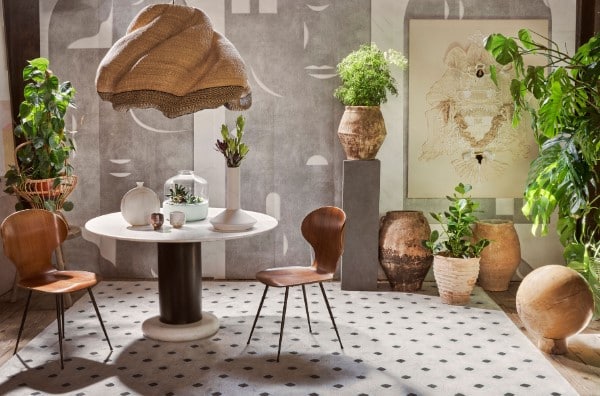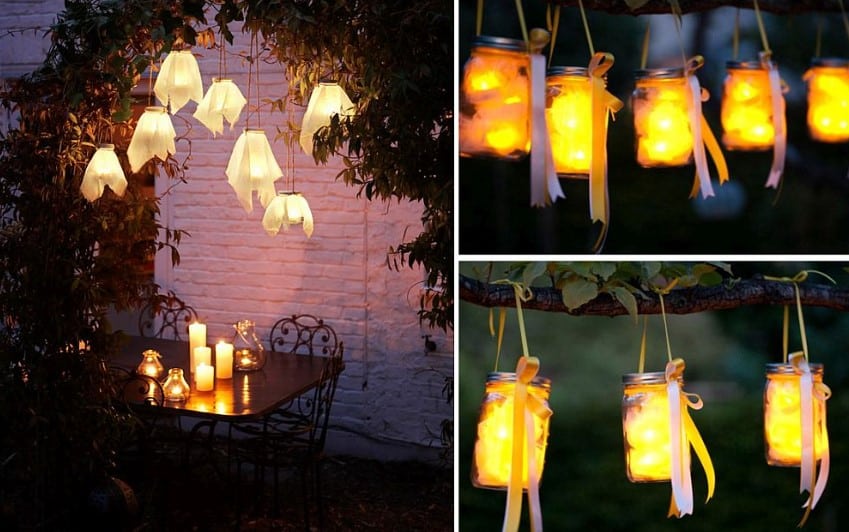Sustainable Interior Materials – Creating a sustainable home environment is increasingly important as people become more conscious of their impact on the planet.
Using eco-friendly, sustainable interior materials not only reduces your carbon footprint but also enhances the quality of your living space.
This site roomvivo.com explores the best sustainable interior materials available, their benefits, and how you can incorporate them into your home.
We will cover products such as recycled wall tiles, sustainable wood panels, and eco-friendly flooring, offering practical advice on where and how to buy them.
Sustainable Interior Materials for Your Home
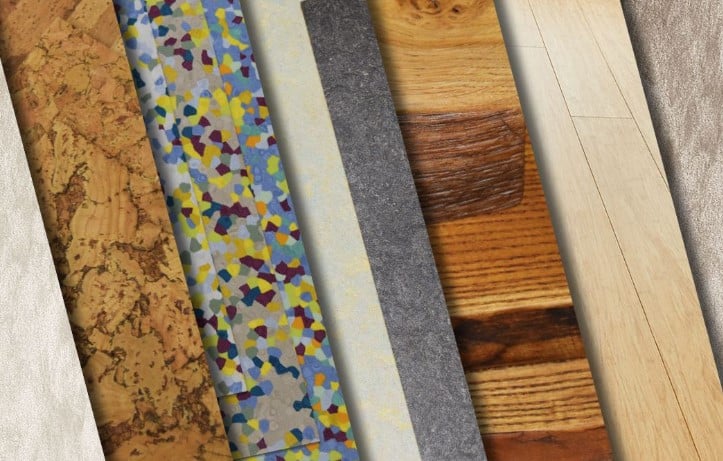
Eco-Friendly Flooring
Eco-friendly flooring is a popular choice for sustainable interiors. It’s made from natural, renewable resources like bamboo, cork, and reclaimed wood. These options not only look great but also offer durability and comfort.
Cork flooring, for instance, is harvested without harming trees, while bamboo is a rapidly renewable material, growing back much faster than traditional hardwood.
When considering eco-friendly flooring, it’s essential to understand the long-term benefits it provides beyond mere aesthetics.
By opting for sustainable materials like cork and bamboo, homeowners can significantly reduce their environmental footprint while enhancing indoor air quality.
Benefits of eco-friendly flooring include:
- Durability: These materials are designed to last, reducing the need for frequent replacements.
- Low VOC emissions: They emit fewer volatile organic compounds (VOCs), making them healthier for indoor air quality.
Pros:
- Sustainable and renewable
- Low maintenance and easy to clean
- Wide range of aesthetic options
Cons:
- Some options can be more expensive upfront
- Limited availability depending on location
Price:
- Bamboo flooring: $3 to $8 per square foot
- Cork flooring: $5 to $12 per square foot
Where to Buy: Eco-friendly flooring can be purchased from retailers like Home Depot or Lowe’s.
Sustainable Wood Panels
Sustainable wood panels are crafted from certified forests or reclaimed wood, ensuring minimal environmental impact. These panels are ideal for walls, ceilings, and furniture, providing a rustic and natural look that adds character to any home.
Sustainable Wood Panels are an eco-friendly choice for homeowners looking to add a natural touch to their spaces.
Made from certified forests or reclaimed wood, these panels ensure minimal environmental impact while offering durability and timeless appeal.
Perfect for walls, ceilings, or furniture, they bring a rustic and warm aesthetic that enhances any home interior.
For those seeking eco-friendly wood products or reclaimed wood paneling, sustainable wood panels provide a responsible and stylish solution
Real-World Example:
- Product: FSC-Certified Wood Panels
- Use Case: Perfect for accent walls or furniture, these panels are sourced from forests managed sustainably to prevent deforestation.
Pros:
- Aesthetically pleasing and versatile
- Reduces waste by using reclaimed materials
- Durable and long-lasting
Cons:
- May require special maintenance (e.g., sealing)
- Higher cost compared to non-sustainable options
Price:
- Reclaimed wood panels: $10 to $20 per square foot
Where to Buy: Buy FSC-certified wood panels from Wayfair or Eco Supply.
Recycled Wall Tiles
Recycled wall tiles are made from post-consumer materials such as glass, ceramic, and stone, turning waste into a valuable home design element.
These tiles are perfect for kitchens, bathrooms, and feature walls, providing a unique look while contributing to sustainability.
Recycled wall tiles are an excellent choice for homeowners looking to combine style with sustainability. Crafted from post-consumer materials like glass, ceramic, and stone, these eco-friendly tiles bring a unique aesthetic to kitchens, bathrooms, or feature walls.
Whether you’re searching for sustainable home decor ideas or exploring eco-friendly tile options, recycled wall tiles offer a durable and environmentally conscious solution that elevates any space while reducing waste.
Benefits:
- Durable and Versatile: Ideal for both indoor and outdoor use.
- Customizable Designs: Available in various colors and patterns, offering flexibility in interior design.
Real-World Example:
- Product: Fireclay Tile Recycled Glass Tiles
- Use Case: Suitable for shower walls, kitchen backsplashes, or decorative accents.
Pros:
- Uses recycled materials, reducing landfill waste
- Low maintenance and easy to clean
Cons:
- Installation can be labor-intensive
- Prices may vary depending on customization
Price:
- Recycled glass tiles: $25 to $50 per square foot
Where to Buy: Recycled wall tiles can be found at Fireclay Tile or TileBar.
Non-Toxic Paint
Non-toxic paint, also known as low VOC or zero VOC paint, is designed to improve indoor air quality by reducing harmful emissions.
Brands like ECOS Paints and Benjamin Moore offer a range of eco-friendly paints that are perfect for creating a healthy and DIY & sustainable living space.
When selecting non-toxic paint for your home, it’s essential to consider options that not only prioritize your health but also enhance the aesthetic appeal of your living space.
Many homeowners are now turning to low VOC paint varieties, which are specially formulated to emit minimal volatile organic compounds, ensuring a safer environment for families and pets alike.
In addition to brands like ECOS Paints and Benjamin Moore, you can find a variety of eco-friendly paint options that promote sustainable living while delivering stunning finishes.
Benefits:
- Safe for Children and Pets: These paints contain no harmful chemicals, making them a safer option for homes with kids and animals.
- Long-Lasting Color: High-quality, non-toxic paints retain their vibrancy over time.
Real-World Example:
- Product: Benjamin Moore Natura Paint
- Use Case: Ideal for nurseries, bedrooms, and living rooms where air quality is a concern.
Pros:
- Safe for sensitive individuals
- Wide range of color options available
Cons:
- Can be more expensive than traditional paints
- Limited availability in some regions
Price:
- $35 to $70 per gallon
Where to Buy: Purchase non-toxic paint from Benjamin Moore or ECOS Paints.
Reclaimed Wood Decor
Reclaimed wood decor offers a sustainable way to add warmth and charm to any space.
From furniture to wall art, reclaimed wood pieces not only minimize waste but also tell a story with their unique textures and patterns.
Real-World Example:
- Product: Reclaimed Wood Floating Shelves
- Use Case: Ideal for creating a rustic, cozy look in kitchens, living rooms, or home offices.
Pros:
- Eco-friendly and unique
- Adds character to interiors
Cons:
- Limited availability due to the nature of reclaimed materials
- Maintenance may be required (e.g., polishing)
Price:
- Floating shelves: $50 to $150 per piece
Where to Buy: Shop reclaimed wood decor on Etsy or West Elm.
You can also read : DIY Lantern Ideas Outdoor Lantern Projects
Benefits of Using Sustainable Interior Materials
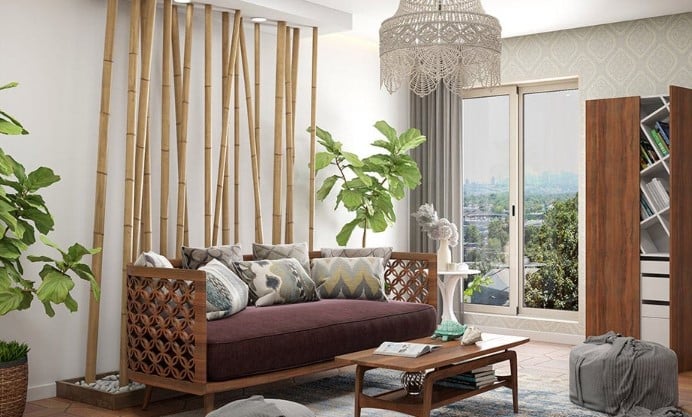
Using sustainable materials in interior design brings multiple benefits:
Environmental Impact:
- Reduces waste and resource depletion
- Supports recycling initiatives and sustainable forestry
Health Benefits:
- Non-toxic materials improve indoor air quality
- Reduces exposure to allergens and harmful chemicals
Long-Term Savings:
- Sustainable materials are often more durable, reducing replacement costs
- Eco-friendly products can also contribute to energy savings in the home
How to Choose and Buy Sustainable Interior Materials
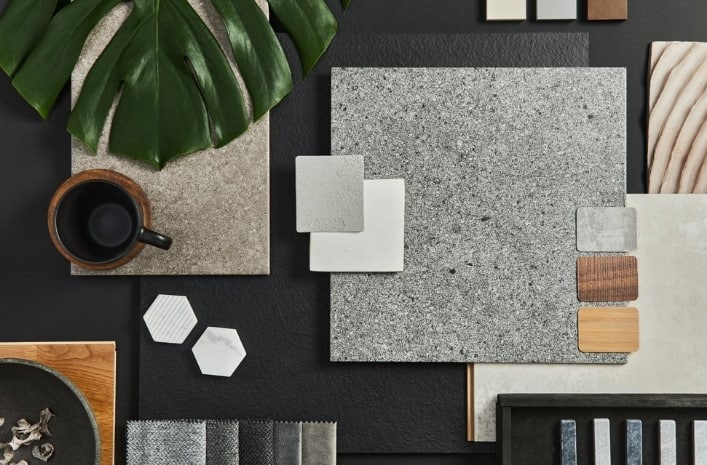
When shopping for sustainable interior materials, it’s important to verify their eco-friendly credentials. Look for certifications such as:
- FSC Certification for wood products
- Low VOC labels for paints and flooring
- Cradle to Cradle Certification for products designed to be reused or recycled
Purchase materials from reputable retailers like Home Depot, Wayfair, or Etsy. Compare prices and features to find the best option for your needs.
FAQs
1. What are the most sustainable flooring options?
Bamboo and cork are the most sustainable flooring options due to their rapid renewability and minimal environmental impact.
2. Is reclaimed wood more expensive than new wood?
While reclaimed wood can sometimes be more expensive due to its unique nature, it also offers durability and a distinctive look that new wood might lack.
3. Are recycled wall tiles durable?
Yes, recycled wall tiles are highly durable and suitable for both indoor and outdoor use, making them an excellent sustainable choice for various surfaces.
